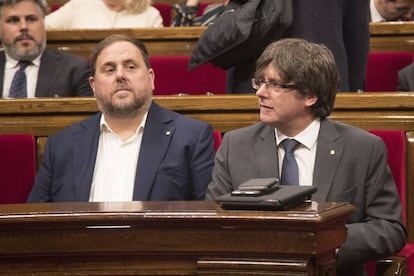Catalan parliament passes controversial referendum law
Central government in Madrid responds by calling for Constitutional Court to appeal legislation
The Catalan parliament on Wednesday held a marathon session in which the ruling pro-independence coalition pushed through a law approving an October 1 referendum on self-rule in the northeastern Spanish region.

Opposition groups Ciudadanos, the Catalan Socialists (PSC) and the Catalan Popular Party (PPC) walked out in protest during the vote.
Tempers had flared and accusations had flown all day inside the regional chamber, where the opposition accused the ruling Junts pel Sí and its partner, the anti-capitalist CUP group, of commandeering parliament to achieve their independence goals with contempt for legal procedure.
Opposition deputies said that their parliamentary rights were being violated by the backdoor technique
Opposition deputies said that their parliamentary rights were being violated by the backdoor technique that was employed to get the bill passage included on Wednesday’s agenda.
The Spanish government in Madrid has already announced that it will appeal the law before the Constitutional Court, while an emergency Cabinet meeting is scheduled for Thursday to discuss Madrid’s next move.
Deputy Prime Minister Soraya Saénz de Santamaría said that what had taken place inside the Catalan parliament on Wednesday was “an act of force against the rights of Catalans and their representatives. We defend law and democracy in Catalonia and in the rest of Spain. We stand opposite those who walk all over whoever disagrees with them.”

Meanwhile, prosecutors at the Superior Court of Justice of Catalonia are filing charges of disobedience and unlawful decision-making by an acting official against the five members of the Catalan parliament’s chair, including speaker Carme Forcadell, whose support enabled the Wednesday vote to take place.
Consensus
In a rare show of consensus, Spain’s Socialist Party (PSOE) has closed ranks with the conservative Popular Party (PP) over Wednesday’s events.
“We stand with the state and with the government against this attack on democracy,” said PSOE Secretary General Pedro Sánchez, who criticized the October 1 referendum on the basis that it does not meet any of the requirements set out by the Council of Europe’s Venice Commission, an international body that provides advice on referendums. “They call it a referendum, but it’s not a referendum,” he continued.
Even Joan Coscubiela of the leftist Catalunya Sí que es Pot, which includes left-wing anti-austerity group Podemos, was highly critical of the secessionists’ methods.
“A majority of this chamber wants to torpedo all guarantees of parliamentary procedure and of deputies’ rights. There is no precedent for this,” he said, describing the move as “buccaneer procedure” because “it shoots at whatever it doesn’t like.”
Faced with recurring accusations of illegitimacy surrounding the referendum and its legal framework, Oriol Junqueras, leader of the pro-independence Catalan Republican Left (ERC), insisted on Wednesday that “international law protects us and there is no state law prohibiting the referendum; holding it is not illegal.”
Prosecutors at the Superior Court of Justice of Catalonia are filing charges of disobedience and unlawful decision-making
For four hours beginning at 10am, the debate focused not on the referendum itself, but on the fact that the bill was being put to the vote at all, after pro-independence groups managed to alter the day’s agenda in order to include the issue.
Junts pel Sí admitted that they were not happy about the means employed either, but argued that they had no other way to get the bill on the floor. According to the deal struck between Junts pel Sí and CUP, the referendum law will be fast-tracked through parliament, skipping two steps that bills normally go through: debates on amendments and a report by the Council of Statutory Guarantees.
“This is a debate about exercising the right to self-determination in Catalonia, it is not a debate about just any ordinary law,” said Junts pel Sí spokeswoman Marta Rovira to justify the streamlined procedure.
The Catalan regional government was expected to meet right after the vote to approve a decree officially calling a referendum on independence for October 1.
English version by Susana Urra.
Tu suscripción se está usando en otro dispositivo
¿Quieres añadir otro usuario a tu suscripción?
Si continúas leyendo en este dispositivo, no se podrá leer en el otro.
FlechaTu suscripción se está usando en otro dispositivo y solo puedes acceder a EL PAÍS desde un dispositivo a la vez.
Si quieres compartir tu cuenta, cambia tu suscripción a la modalidad Premium, así podrás añadir otro usuario. Cada uno accederá con su propia cuenta de email, lo que os permitirá personalizar vuestra experiencia en EL PAÍS.
¿Tienes una suscripción de empresa? Accede aquí para contratar más cuentas.
En el caso de no saber quién está usando tu cuenta, te recomendamos cambiar tu contraseña aquí.
Si decides continuar compartiendo tu cuenta, este mensaje se mostrará en tu dispositivo y en el de la otra persona que está usando tu cuenta de forma indefinida, afectando a tu experiencia de lectura. Puedes consultar aquí los términos y condiciones de la suscripción digital.








































